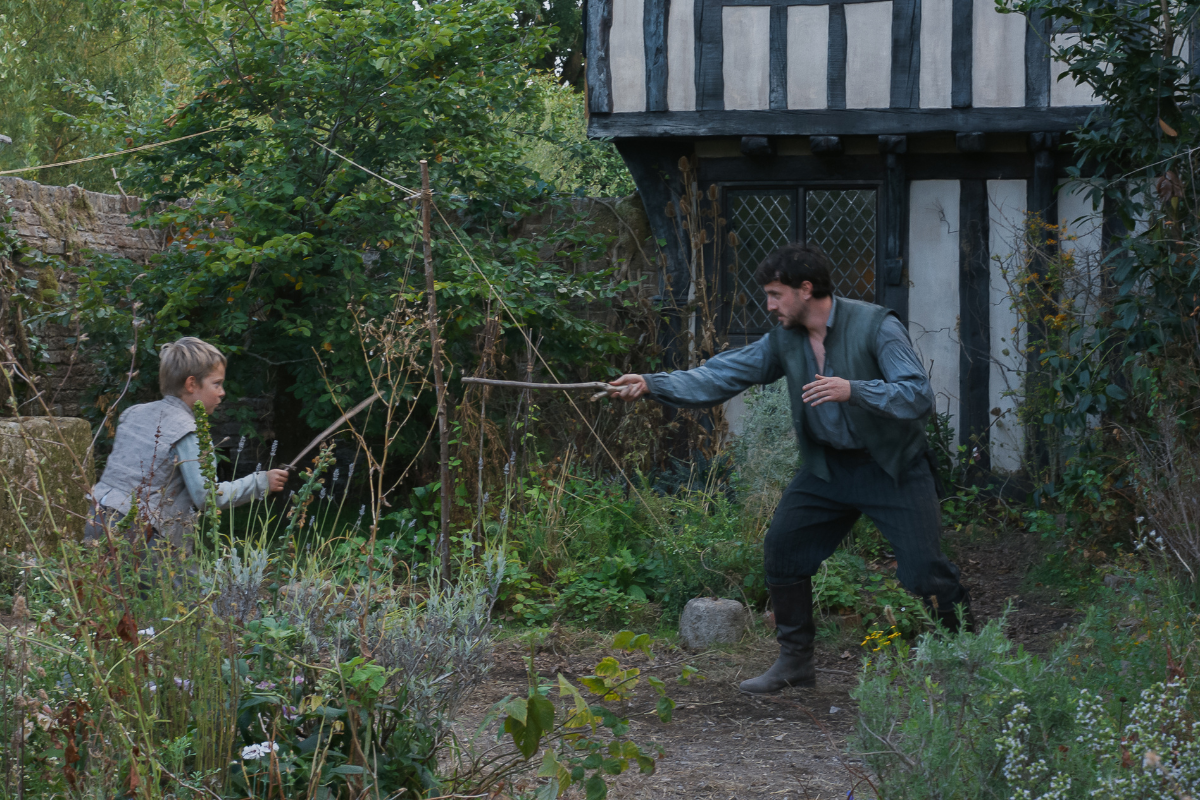Showing the Full Range of Humanity: Q&A with Greg Cope White on Netflix’s ‘Boots’
Greg Cope White discusses adapting his book “The Pink Marine,” the collaborative spirit in the writers’ room, his mentorship under Norman Lear, and more!
Greg Cope White is a Hollywood veteran (Walk Ride Rodeo, Dream On, The Powers That Be), and he’s also a veteran of the U.S. Marine Corps. As a closeted gay teenager in New Orleans, he survived violent bullying by his peers. To escape, he followed his best friend to Marine Boot Camp at Parris Island, South Carolina. As explained on the back cover of his memoir, The Pink Marine, “all he heard was ‘summer’ and ‘camp’.” Greg excelled and remained in the Corps for six years, ultimately attaining the rank of Sergeant.
Lucky enough to be mentored by and write for the legendary Norman Lear, Greg always knew he intended his memoir to become a series. Lear, a veteran of the U.S. Army Air Forces who flew 52 missions, loved hearing Greg’s stories and became a champion for Boots, the Netflix adaptation of The Pink Marine, which premieres all eight episodes today. Boots turned out to be Lear’s last project before he passed away in 2023 at the age of 101. He saw the first three episodes completed.
In the midst of a flurry of activity leading up to today’s launch, Greg was generous enough to make time to speak with Script.
Sarah: This was Norman Lear’s final project before he passed away in 2023. How did you originally connect with him?
Greg: I can't even believe that I get to answer this question. I was a major fan of Norman Lear's, growing up as a little gay closeted kid, seeing the bits of LGBTQ+ life that he was brave enough to show in the 1970s and ‘80s, from the trans characters in All in the Family and The Jeffersons and All That Glitters to the gay characters in Mary Hartman, Mary Hartman with a gay marriage storyline. In 1976. These shows were illuminating for me. To land in his orbit is mind blowing,
I was lucky to get a job as a production assistant in his office in 1992. We shared stories about my time in the Marine Corps, and his about his time in the military. We laughed a lot. The stories are funny! He was a terrific mentor. He opened my eyes to how much story can show us about our shared human experience.
Sarah: Tell me about making the military not only accessible, but also funny.
Greg: Much of our society doesn't have military experience, but everybody loves to laugh, right? In the book I wrapped those brutal boot camp moments in humor, because for me, humor has always been the way I connect—even in the hardest moments, it’s been my bridge to people. In the series, Cameron faces the same fear of ruining his reputation or worse should his secret get out and trust me, from the been there done that place—there’s hilarity in anxiety.
Sarah: From the trailer, it seems there’s some intense drama and a small amount of campiness. It’s a really interesting juxtaposition. How much of this came from the writing, how much came from the director, how much did the actors bring to it?
Greg: Our show’s creator, Andy Parker, had me at his public “the book is hysterical.” Between him and co-showrunner Jennifer Cecil, I felt my story was safe and I knew we’d use humor in the show. I love the sting of a dramatic moment zinged with a laugh. In the writers’ room, my job is to support the showrunners’ vision, and it felt very natural to me to lean into that balance of drama and funny-as-hell.
Boot camp is…camp. Our cast became a tight, close platoon. We have fabulous directors. Our set designers were on it. I'm grateful that everyone—studio and network executives, crew, background, Military advisors, 400 craftspeople—all worked together to make what I feel is an authentic, funny and powerful series, a look at our society in a pressure cooker.
Sarah: Were there other military veterans in the writers’ room?
Greg: The cool Megan Ferrell Burke, a Marine officer, Nick Jones, Jr., also USMC, and our writers’ assistant, Melissa Ritz, Air Force. She helped with insight into that branch, which is part of the story. A writers’ assistant usually has their own writing goals too—it’s often the first step on the ladder. Norman lifted me up, so I try to do the same for others.
Also, I hope you get to know two more writers I am lucky to work with, Andrea Ciannavei and Dominic Colón. Stunning writers from whom I learn.
Sarah: Tell me about your writing process.
Greg: My muse is a hungry beast because it finds me in the kitchen. I cook a lot; cooking is part of my process. I love the feeling of a spark of an idea, yet I need to let it marinate in my head until it’s gelled enough to write. I also practice staring at the screen in case there’s a staring at the screen contest. I plan to win.
I keep a full plate of projects. I’m also aware, probably because I'm 65, of how precious time is so I dig into my USMC discipline and write wherever and whenever.
Sarah: You’re a TV writer, but in this instance, the series is based in part on your experience. What’s this moment like for you?
Greg: It’s wild, wonderful, difficult. I feel gratitude for every new moment—Norman taught me to live in the moment, and this is one of those rare times where the spotlight’s on me. I want to pull others into that light, especially our trans brothers and sisters in and out of the military.
What began with me, alone at my desk, wrestling the same doubts every writer knows—will anyone read this, is it any good, I suck, what else can I do for work —grew into my seat at the writers’ room table led by two brilliant showrunners. Together we expanded my story into our story. The book and the series go hand in hand while each stands on its own. Like a Marine Corps mission, both are the result of individual dedication that becomes possible only through teamwork.
Sarah: The actors’ options have been extended, which sounds optimistic for a season 2. Do you have any information about that yet?
Greg: No, we don't, but of course, I welcome a season two through seven. All of us writing and working on the show have fallen in love with these characters. I hope we get to take them to other places and continue being entertained and informed by their beautiful, messy lives. So please watch the show. Watch it all the way through. Give it a thumbs up if so inclined. And please share it. My pencils are sharpened, and I have writers room outfits ready.
Sarah: What do you hope people take away from Boots?
Greg: I appreciate the time spent watching our show. Boots is big and wild, filled with interesting, funny characters and stories. Who else comes in hiding something? Maybe someone has faced prejudice for the color of their skin, or their intelligence, or their weight. I hope the audience might see a bit of themselves in the story and feel less alone.
We’re all going through life together, even if the settings look different. Why not support each other and have some fun along the way? For veterans who may not be ready to share their service, maybe this sparks a conversation with their families. And for a young person who doesn’t feel safe being their authentic self, maybe they’ll see a little hope in these characters’ journeys.
Sarah: What advice do you have for young screenwriters?
Greg: I don’t know if advice helps as much as practice does. For me, it’s all about getting the story out of my head and onto the page.
Maybe find a writers group if you’re not in one. A squad. But do what works for you. For me, what’s worked best is striving to tell the story I want to write. Not always trying to fit my work into what I perceive the market wants.
Boots is now streaming exclusively on Netflix.







